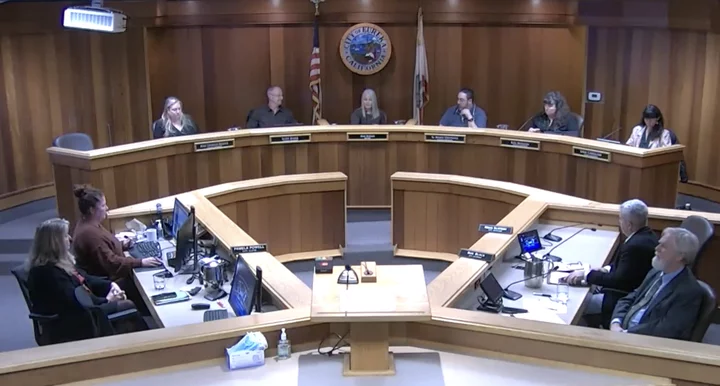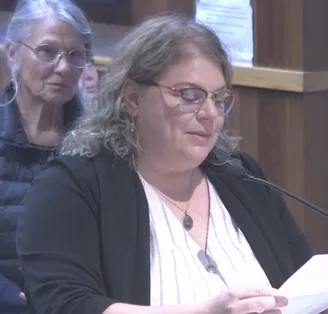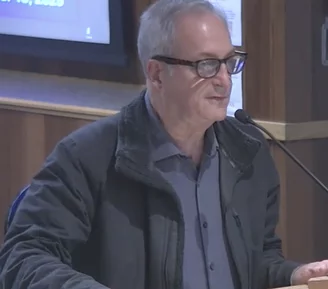Screenshot of Tuesday’s Eureka Council meeting.
###
In response to the recent lapse in funding for federal Supplemental Nutrition Assistance Program (SNAP) benefits, the Eureka City Council on Tuesday approved $30,000 in funding to support local food assistance programs. The funds will be equally split — $15,000 apiece — between Food for People and St. Vincent de Paul’s dining facility in Eureka.
Speaking at Tuesday’s meeting, Eureka City Manager Miles Slattery explained that the proposal came about “out of concern for SNAP benefits going away” during the government shutdown, which ended Nov. 12. “SNAP benefits were reinstated … but [there] are other issues pending that could be coming to people who provide food for our community,” he said.
While SNAP, known as CalFresh in California, is not presently at risk, the recent lapse in federal funding showed just how quickly local resources can become overwhelmed “when the food security safety net breaks down,” said Ashliegh Diehl, treasurer for Food for People.
“In the days following the announcements of delayed SNAP benefits, Food for People saw an immediate 40 percent increase in people seeking our assistance,” Diehl said while commenting on the council’s proclamation for Hunger and Homelessness Awareness Week. “Many of them were scared, not knowing how they’d feed their family. While that emergency has passed, looking ahead, we anticipate an additional strain.”
Policy changes enacted through the One Big Beautiful Bill Act will “significantly change” how SNAP benefits are administered and who is eligible, Diehl said.
“These shifts will place new burdens on states and communities, and ultimately reduce access for many people who currently rely on food assistance here in Humboldt,” she continued. “Thousands of residents could be affected, which will increase pressure on local food banks and other community organizations. When the larger safety net wavers, the impact is immediate at our local level.”
Staff had initially suggested that Foor for People and St. Vincent de Paul’s split the $15,000 in participatory budget funds, but Councilmember Leslie Castellano asked if it would be possible to up the city’s contribution by another five or ten thousand dollars. Slattery said he was fairly confident that increasing allocation wouldn’t threaten the city’s budget.
During public comment, St. Vincent de Paul Redwoods Region Board President Bob Santilli echoed previous comments about the challenging future ahead, underscoring that the nonprofit sector is often resilient on “precarious” funding streams that “can dry up overnight.”
“We’ve pretty much seen a decline in funding over, I’d say, the last eight years or so, primarily in the grant funding world,” Santilli said. “We’re looking at non-traditional funding measures down the road, and we’ll see what happens, but it’s very much a blessing that yourselves are considering this measure for us, and it’s just further evidence of the long-standing support of the city, and we’re grateful for that.”
Councilmember Castellano made a motion to up the contribution to $15,000 for each organization, which was seconded by Councilmember G. Mario Fernandez. The motion passed in a 5-0 vote.
###
Other notable bits from Tuesday’s meeting:
- Eureka Police Chief Brian Stephens presented the council with a mutual aid agreement for Humboldt County law enforcement that will guide the local response during a major incident or emergency. The agreement — linked here — includes all governmental law enforcement agencies in the county, as well as two tribal agencies. The agreement has already been reviewed by the city’s Independent Police Auditor and the Citizens’ Oversight of Police Practices (COPP) Board. The council agreed to receive and file the report, but did not take additional action on the item.
- The council also received a report on the city’s Façade Improvement Rebate and Crime Prevention Through Environmental Design (CPTED) Grant Program. The program aims to reduce crime and “promote better health and wellness within the community” by improving the exterior of buildings and businesses around town. Eureka’s Economic Development Manager Swan Asbury said the city has had 90-plus site visits where several staffers talk to property owners about maintenance issues and potential improvements, but only 37 people have submitted grant proposals thus far. “I think that it is rare that [our city is] willing to do this, and that’s where the value is,” Asbury said. The council agreed to receive and file the report.
- The council also passed an ordinance designating fire hazard severity zones in the city, which is based on historical fire behavior, fire weather potential and fuel loading. The updated map — linked here — identifies most of Eureka as a “no hazard” zone, with the outskirts of the city designated as a “moderate fire hazard severity zone.
- The council also passed a proclamation acknowledging Nov. 20 as the Transgender Day of Remembrance.



CLICK TO MANAGE